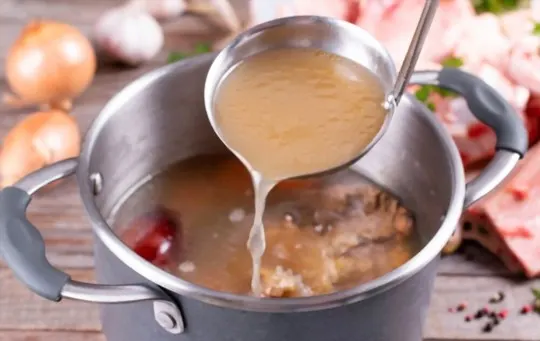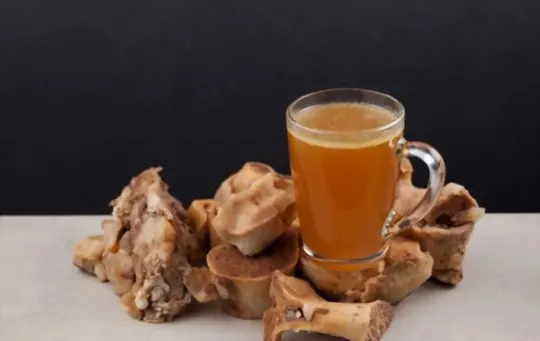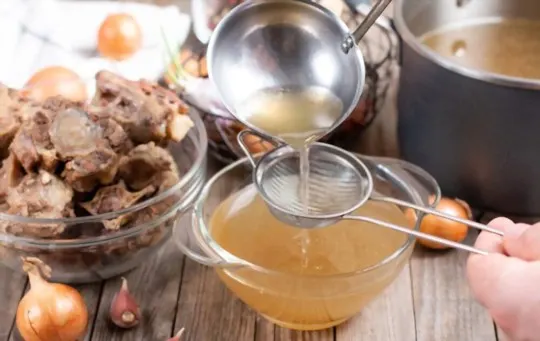Beef broth cans are bought frequently by people as they have them daily.
Thus for easy accessibility, people buy them in bulk and preserve their leftovers.
However, during storage, they get perplexed about how long these can be stored or do beef broth go bad.
There is no doubt that the broth goes bad after a certain period as it has a limited shelf life.
Thus it would be best to be careful while having its leftovers as the broth might have gone bad.
Having foul beef broth can cause abdominal pain, food poisoning, and several other problems.
How Long Does Beef Broth Last? Does Beef Broth Go Bad?

If you are wondering how long its shelf life is, it depends on the storage conditions.
If you have a store-bought broth, then it comes with a best-by date that you can use to have it.
However, this is an estimated date until the producer thinks the broth will retain its quality.
After this date, the broth is fine to eat but might not offer a similar flavor and nutrients as before.
Thus, if you have store-bought broth, you must consume it within the best-by date or provide better storing conditions.
Keeping the broth under favorable conditions will help you to retain its quality.
For an unopened beef broth can, the shelf life ranges from 3 to 5 years at room temperature.
On the other hand, once the can is opened, then it will only serve for 5 to 7 days if refrigerated.
If you desire to exceed its shelf life, you can add broth to the freezer and preserve it for 4 to 6 months.
Homemade broth does not last long as they do not have any added preservatives in them.
The shelf life for the homemade soup bases lies between 2 to 3 days if refrigerated.
If kept in the freezer, you can expect it to last 2 to 3 months.
How to Tell if Beef Broth Has Gone Bad?

- Damaged Can .
After prolonged storage, one must be sure to look for bad signs before consuming the broth.
First, you can notice that the can or storage container must not be damaged.
That is because if there is any opening, it has continuous exposure to air which has contaminated its entire content.
So if the jar is leaking or damaged, you must avoid its consumption.
- Bloated Pack.
Another noticeable change is bloating in the pack or can.
When the pack is exposed to direct sunlight for a long time, the broth releases fumes, resulting in bloating.
So if there is a jar that is bloated, then it is undoubtedly contaminated, and you should discard it.
While purchasing beef broth, remember not to buy bloated packs or cans.
- Discoloration.
To find out if the leftovers are safe to eat, you can see if there is any discoloration.
The beef broth will only change its color when it goes bad.
A fresh soup base has a deep brown color, but it gets a darker shade when it gets contaminated.
You can also notice blue patches on the surface when it is infested with bacteria.
How to Store Beef Broth?

- Store at a Cool and Dry Place.
For better storage, you need to avoid storage in humid areas as they are prone to bacterial infection.
Also, avoid keeping the jar in direct sunlight, as it can also cause contamination.
So for the longer shelf life of beef broth, one needs to keep it in a cool and dry place.
Storage at the pantry is advisable till the pack is unopened; after that, these should be refrigerated.
- Seal Tight Container.
Excess air exposure can make the broth lose potency, so one must seal the pack before keeping the leftovers.
For this, you can use a plastic bag or an airtight container to minimize exposure to beef broth.
Proper sealing will prevent bacteria and other elements from getting in a jar and provide it with a prolonged shelf life.
- Freezing or Refrigeration.
A dry cabinet can only keep the broth safe for a short period; after that, you need to freeze or refrigerate it.
Only these can help you slow the oxidation process by minimizing exposure to all other elements.
Be sure to keep the broth in an airtight container, as they are most likely to get moisture and mold.

Leave a comment